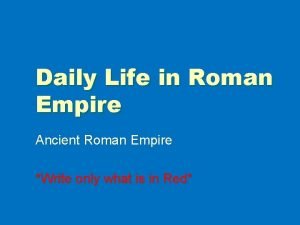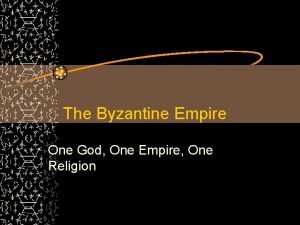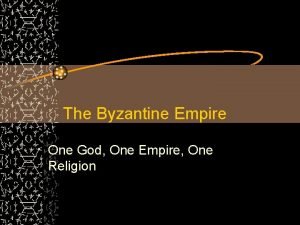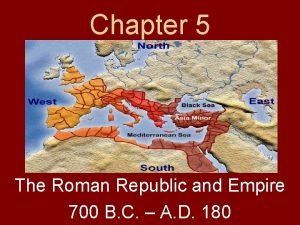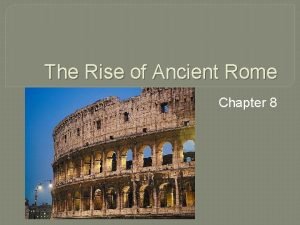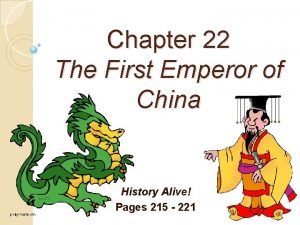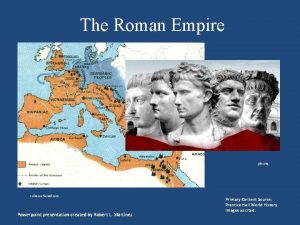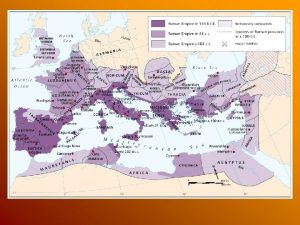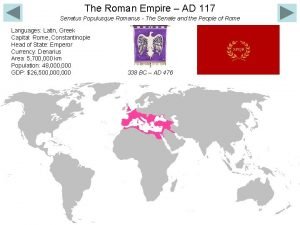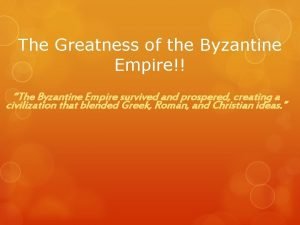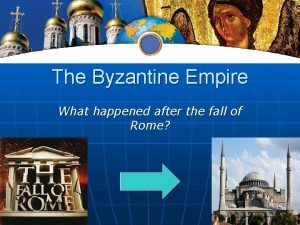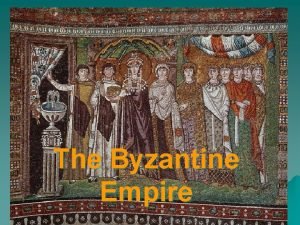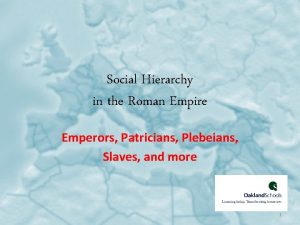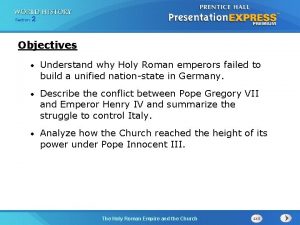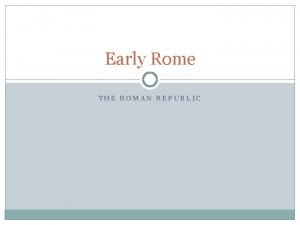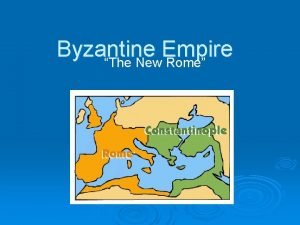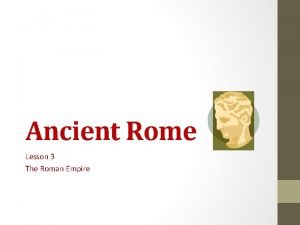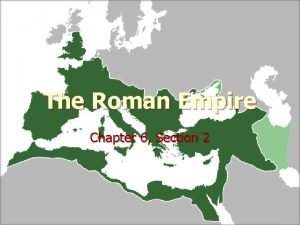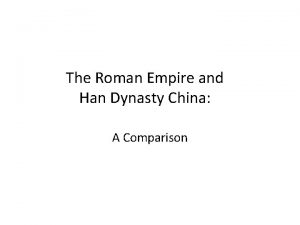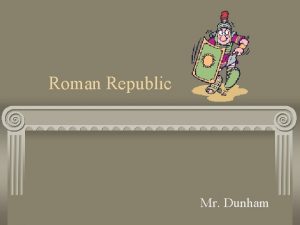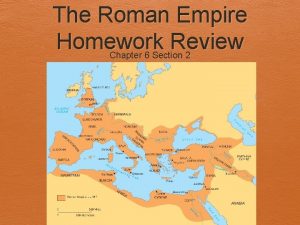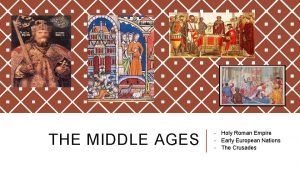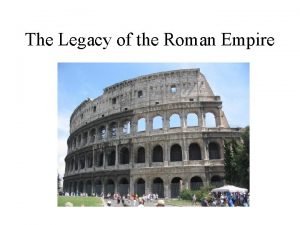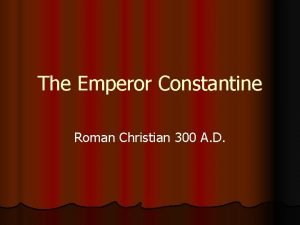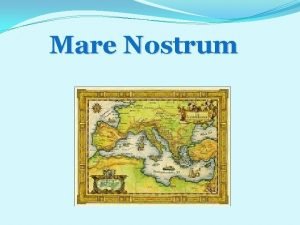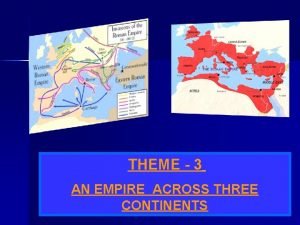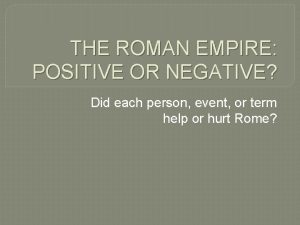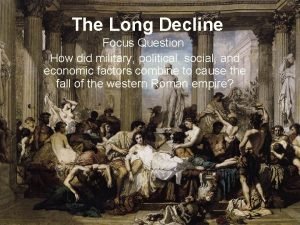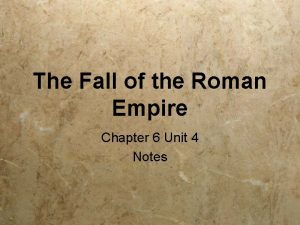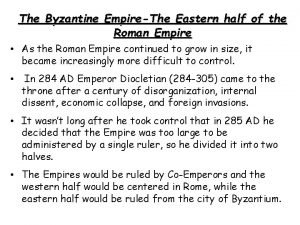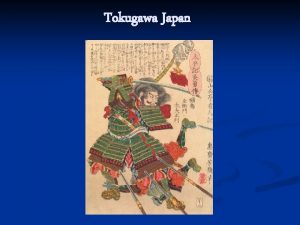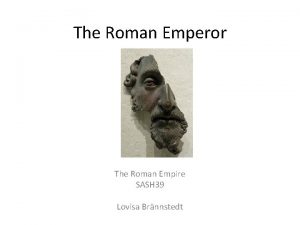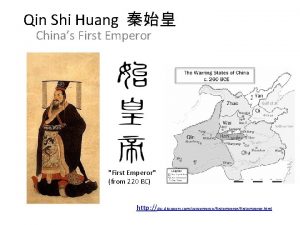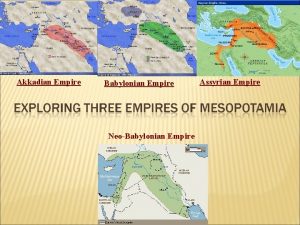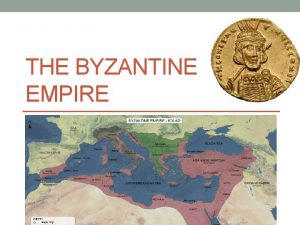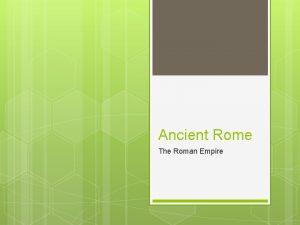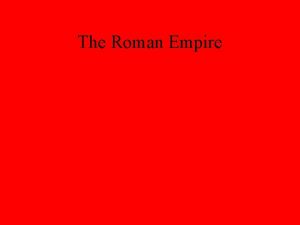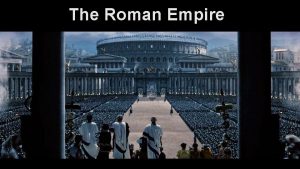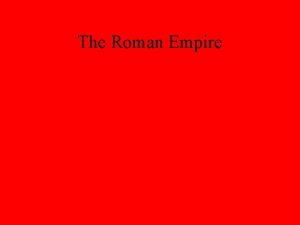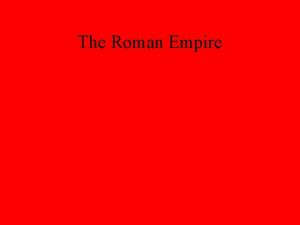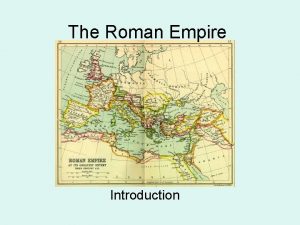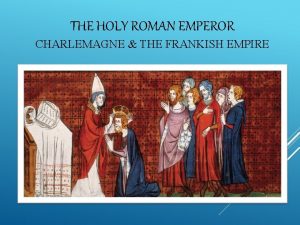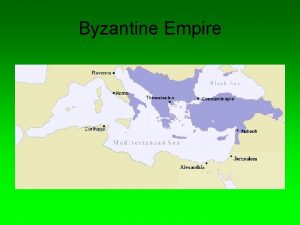The Roman Empire First Roman Emperor The First













































- Slides: 45

The Roman Empire

First Roman Emperor • The First Roman Emperor was Octavian Caesar • Became Emperor in 27 BCE • Ruled until 14 CE

Rise of Augustus • Was adopted by Julius Caesar from a distant branch of his family known as the Octavii – Chosen for his intelligence and charisma – Became Pontifex Maximus at Caesar’s insistence at a young age

Post-Assassination • Octavian unites with Marc Antony and Marcus Lepidus, two of Caesar’s generals – Muster his legions against the Senate – Succeed in hounding Brutus and the coconspirators to their deaths

The Second Triumvirate • Changed Roman constitution to abolish title of Dictator – Officially created a second Triumvirate with himself, Lepidus and Antony in charge – Vastly reduced the power of the Senate • In essence, replaced one dictator with three

Octavian gains power • The Triumvirates restored their personal wealth and the wealth of Rome through proscriptions – Definition: Declaring someone an enemy of the state, allowing the state to seize them and their personal wealth • The Triumvirates used proscription to remove their enemies and get wealthy from the spoils

Collapse of the Triumvirate • Antony detested Octavian – Spent most of his time away from Rome campaigning • Octavian manipulates Lepidus – Lepidus is jealous of his more powerful peers – Octavian convinces him to join him against Antony, gives him command of some legions • On cue, Lepidus attempts to betray Octavian and lead his legions against him • Octavian strips him of his power

Collapse of the Triumvirate • Octavian moves the full force of Rome against Antony after proscribing him – Antony vastly underestimates Octavian’s skill as a general – Attempts to form an alliance with Egyptian Queen Cleopatra • Octavian destroys his navy at the Battle of Actium, forces Cleopatra and Antony to kill themselves

Augustus the Emperor • Took as his official title: Princeps, which meant First Citizen • Why choose that instead of Imperator (Emperor), Rex Maximus (Greatest King) or something along those lines? • Senate bestowed Octavian with the title Augustus meaning “majestic” which Octavian took as his new name

Pax Romana • re-organized empire into 40 Provinces • Each Province had its own governor or Rector, chosen from the Senate – These Rectors were paid personally by Augustus

Pax Romana 27 BCE-180 CE • Pax Romana means Roman Peace • Definition: A continuous period of growth, and unity for the Empire that marked the height of Roman power

Great Buildings • Augustus began several building projects around the Empire to make it stronger • ROADS: to move goods, and more importantly, armies – Maintained by a professional builders • Many of these roads are still usable today

Why are Roman Roads so good?

Great Buildings • AQUEDUCTS: For channeling water to croplands and cities. – Augustus vastly expanded the aqueduct network – Made water freely available to all citizens

Great Buildings • FORUMS: For governing and trade – Each provincial capital got its own forum – Roman forum was rebuilt and expanded

Great Buildings • Colosseums: For entertainment, sports and culture – The Colosseum was built with money from Augustus’ personal fortune • Featured gladiatorial combat, typically free to citizens

Famous Quote • Augustus famously said – “I found Rome a city of brick and left it a city of marble. ”

Military Campaign • Augustus began a campaign to expand the Empire • Took a new first name Imperator – Meaning “victorious” – This would later become the official title of all Roman leaders to follow – Base of the word Emperor

Military campaign • Forcefully converted all client kingdoms into provinces, removing their leaders – Including the son of Herod the Great • Successfully negotiated for the return of all battle standards lost by Crassus at Parthia – Restored the old legions

Limits of the Empire • Augustus forced to stop expansion into Germany because of the Battle of Teutoberg Forest – Augustus’ forces under Publius Varo was massacred by German tribes led by Arminius – First time an entire Roman legion was destroyed – Roman Empire would never expand into Northern Germany

The Battle

Making the Empire Last • Augustus chose his stepson Tiberius to be his successor. Making him his assistant so he could learn how to be a good ruler. • Known as a brilliant general but a gloomy man in person • Made little effort to protect his legacy

Caligula • Took over after Tiberius • Spent 27 million pounds of gold on parties and riches for himself, bankrupted Rome • Conquered all of Egypt • Went insane after a famine, tried to make his horse a Senator • Assassinated by the Praetorian Guard – Elite troops that guarded the Empire – Last of the Caesar line, replaced by Claudius

Caligula

Claudius • Led Praetorian guard that killed former Emperor • Ruled after Caligula, had a short reign – Finished conquest of Britain – Expanded transportation with a series of canals – Known for his humility • Sat with the Senate, waited his turn to speak • Assassinated: Claudius died of poison, likely by his wife to make way for her son Nero

Nero • Took throne as young man, initially controlled by mother and advisors, before he had them assassinated. • Great Fire of Rome – Roman historian Seutonius claims Nero started Fire – Used fire to consolidate power, spending money to aid poor and building a massive new palace – Blamed fire on Christians and Jews, used it as an excuse to persecute

The Great Fire and Nero

Nero’s Death • Nero commits suicide after governor’s rebel against his harsh taxes – Kills himself before the Praetorian Guard can arrest him on the Senate’s orders

Emperor Titus • Military commander, took control after Nero – Most famous for brutally putting down Jewish rebellion – Delighted in torturing prisoners according to Josephus

The Kanaim/Zealot Rebellion 66 -70 • Under Caligula, Roman Emperor declared a God, required a statue of Emperor displayed in all temples • War averted with Caligula’s death • Under Nero, persecution of Jews and Christians common – Refused to include worship of Caesars in religion

The Kanaim/Zealot Rebellion 66 -70 BCE • Uprising began when a Roman official stole silver from the Temple • Jewish residents attacked and burned a nearby Roman garrison • Rome responded by sending 60, 000 troops to besiege Jerusalem – Tens of thousands killed – Temple burned – 100, 000 Jews sold into slavery

Death of Titus • Titus is assassinated by his brother Domitian while travelling the country-side – Assassination sets off a brief civil war followed by the interregnum

The 5 Good Emperors 96 -180 • Titus’ death followed by an interregnum – A period without a King or Emperor – Rome ruled by the Praetorian Guard • 96 BCE saw rise of the first of 5 Good Emperors – Nerva – Trajan – Hadrian – Antoninus Pius – Marcus Aurelius

Nerva • Made peace with Senate, highly popular with Roman People • Gave land to the poor, established fair tax system – Unlike previous emperors, Nerva maintained a balanced budget

Trajan • Conquered Eastern Europe and Arabia • Created welfare program for widows and orphans • Created standard weight for money – Why is this important – Created the office of Curator to safeguard the money supply

Hadrian • Recognized the Empire was growing too large to maintain • Retreated back to defensible positions and built massive walls in Britain, Germany and Eastern Europe • Built massive art projects for people of Rome • Created law code forbidding torture and protecting slaves

Hadrian’s Wall in Britain

Religious persecution • Jews of Palestine rebelled after Hadrian attempted to make Roman religion supreme – Forbade circumcision, and worship on the Sabbath • Jewish revolt violently put down, estimated slaughter: 50, 000 men, women and children • Erected a temple to Jupiter on the remains of the Temple

Antoninus Pius • Spread Roman law throughout Empire • Strengthened system of governors • Brought in philosophers from around world to teach in Rome – Open Roman Academy

Antoninus and the Jews • Jewish people sent an emissary including a Rabbi to negotiate for improved conditions with Pius – Emperor met and befriended Rabbi, Pius’ reign saw a renewal of Jewish culture and scholarship – Learned from Rabbi and debated Jewish law – Allowed the erection of a Jewish altar, though he never reportedly converted

Marcus Aurelius • Protected Rome from invasion from Germany and Western Russia • Worked as a philosopher, wrote several books on logic and morality • Murdered by his son Commodus • Death marks the end of Good Emperors, beginning of the Fall of Rome

Emperor Commodus

The Disastrous rule of Commodus • Spent lavishly on himself – Devalued Roman Currency in order to spend more money • Believed himself to be an incarnation of Heracles – Dressed in lion-skins and carried a club – Often participated in battles in the Colosseum – Attempted to rename Rome and the months of the calendar after himself

Commodus’ Assasination • The Senate and the Praetorian guard form a conspiracy to remove Commodus – He is strangled in his bathtub by his own wrestling coach • After his death, Senate declares him an enemy of the state • Damage is done

After Commodus • The Roman Empire now begins a slow period of decline, which will eventually end in its splitting apart and eventual collapse
 Life in the roman empire
Life in the roman empire One empire one god one emperor
One empire one god one emperor One empire one god one emperor
One empire one god one emperor Cursus honorum
Cursus honorum Roman republic vs roman empire
Roman republic vs roman empire Rome chapter 8
Rome chapter 8 Roman emperor simulation game
Roman emperor simulation game Chapter 22 the first emperor of china
Chapter 22 the first emperor of china First mughal emperor of india
First mughal emperor of india Akansha jahangir
Akansha jahangir American empire vs british empire
American empire vs british empire Venn diagram of mauryan and gupta empires
Venn diagram of mauryan and gupta empires Pbs roman empire
Pbs roman empire Roman empire begins
Roman empire begins Spanish empire
Spanish empire What caused the fall of the roman empire
What caused the fall of the roman empire How was byzantium a continuation of the roman empire?
How was byzantium a continuation of the roman empire? Western roman empire
Western roman empire Eastern and western roman empire map
Eastern and western roman empire map Byzantine empire successor
Byzantine empire successor Ancient rome hierarchy
Ancient rome hierarchy The holy roman empire and the church section 2
The holy roman empire and the church section 2 The holy roman empire and the church section 2
The holy roman empire and the church section 2 Bakit lumakas ang europe ng itatag ang holy roman empire
Bakit lumakas ang europe ng itatag ang holy roman empire Glory of the roman empire
Glory of the roman empire Roman empire split
Roman empire split Lesson 3 the early roman empire
Lesson 3 the early roman empire Achievements of the roman empire
Achievements of the roman empire The roads of the roman empire chapter 6 section 2
The roads of the roman empire chapter 6 section 2 Roman empire china
Roman empire china Location
Location Introduction of secretary
Introduction of secretary Golden age of the roman empire
Golden age of the roman empire Calvinism map
Calvinism map Holy roman empire def
Holy roman empire def What was the legacy of the roman empire
What was the legacy of the roman empire Roman empire in 300 ad
Roman empire in 300 ad Dba fanaticus
Dba fanaticus Mare nostrum roman empire
Mare nostrum roman empire High empire art
High empire art An empire across three continents notes
An empire across three continents notes Positives of the roman empire
Positives of the roman empire Revived roman empire
Revived roman empire How did the hun invasion weaken the roman empire?
How did the hun invasion weaken the roman empire? 3.14 quiz: the roman empire crumbles
3.14 quiz: the roman empire crumbles Eastern half of the roman empire
Eastern half of the roman empire
